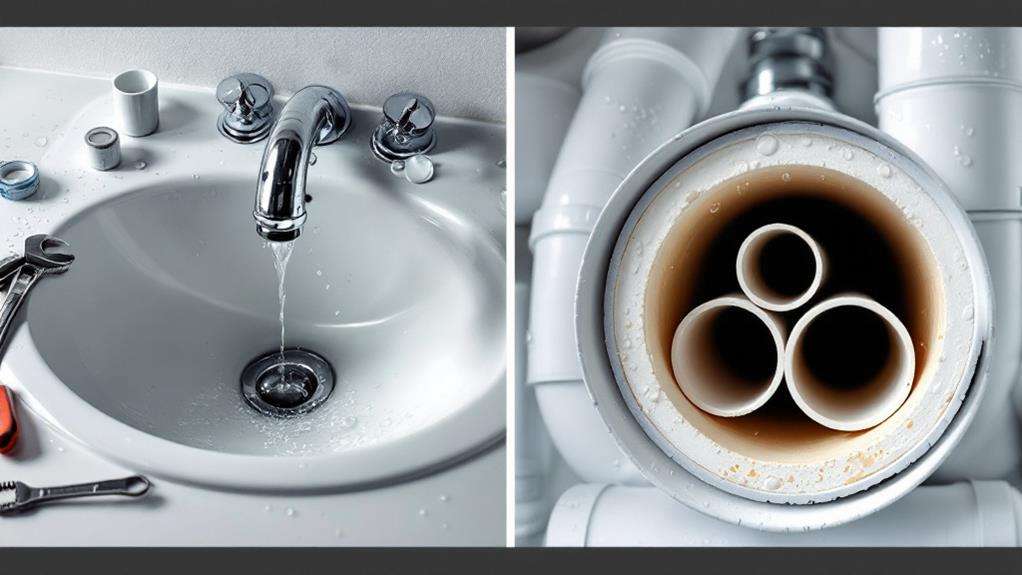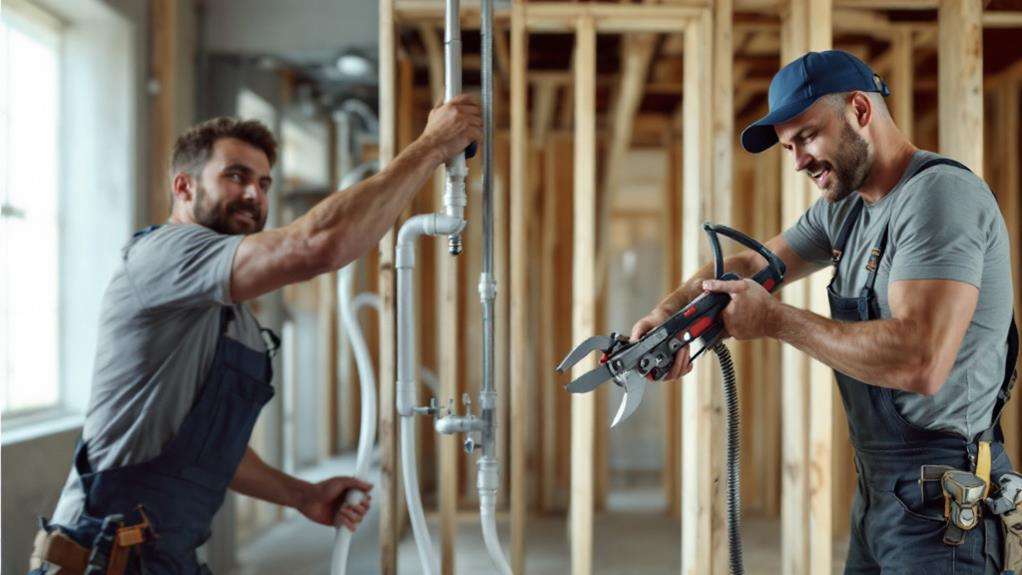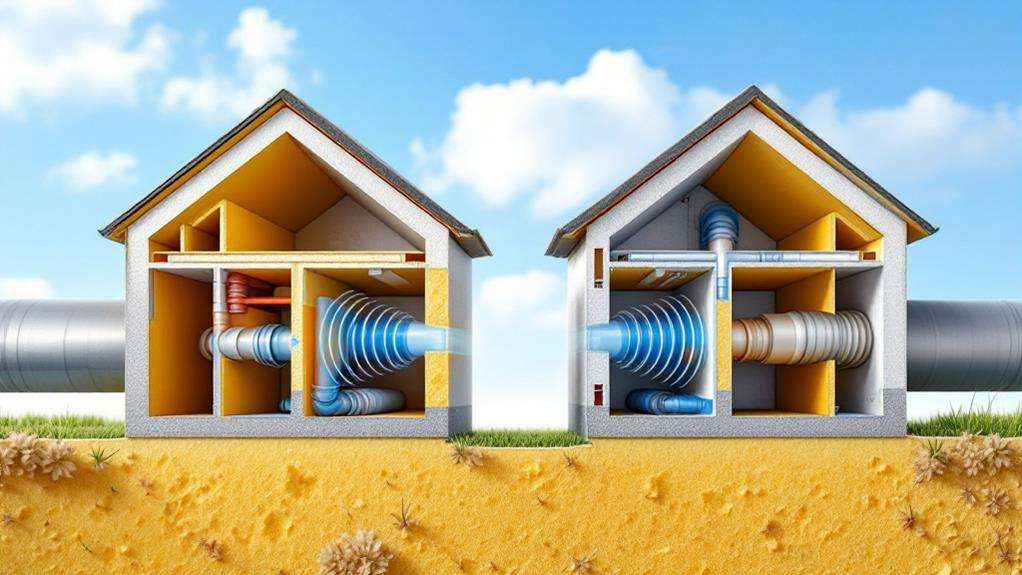Pros and Cons of Plastic vs. Metal Drain Pipes

When deciding between plastic and metal drain pipes, you'll need to weigh several factors. Plastic pipes are generally cheaper, easier to install, and more energy-efficient, but they may have a shorter lifespan. Metal pipes, while more expensive and challenging to install, offer superior durability and sound dampening. Plastic pipes resist corrosion better, but they can become brittle over time. Metal pipes are recyclable, but their production has a higher environmental impact. Both types have their strengths in different areas, such as thermal regulation for plastic and longevity for metal. Your choice will depend on your specific needs, budget, and long-term plans. The following sections will help you make an informed decision.
Cost Comparison
When it comes to cost, plastic drain pipes generally have the edge over their metal counterparts. You'll find that plastic pipes are considerably cheaper to purchase and install, often costing 30-50% less than metal options. This initial savings can be substantial, especially for large-scale plumbing projects or whole-house renovations.
Beyond the upfront costs, plastic pipes offer long-term economic benefits. They're more energy-efficient due to their insulating properties, which can help reduce your water heating expenses. Plastic pipes also maintain consistent water pressure more effectively than metal pipes, potentially lowering your water bills.
However, don't overlook the longevity factor. While plastic pipes are cheaper initially, metal pipes typically last longer. Copper pipes, for instance, can serve you well for 50-70 years, whereas PVC pipes usually last 25-40 years. This durability might offset the higher upfront cost of metal pipes over time.
Consider your budget, the project scope, and your long-term plans for the property when choosing between plastic and metal drain pipes. Remember, the cheapest option isn't always the most cost-effective in the long run.
Durability and Lifespan
Two key factors to ponder when choosing between plastic and metal drain pipes are durability and lifespan. Plastic pipes, typically made from PVC or ABS, offer excellent resistance to corrosion, which can considerably extend their lifespan. They're not susceptible to rust or mineral buildup, often lasting 50-100 years with proper maintenance. However, plastic pipes can become brittle over time, especially when exposed to UV light or extreme temperatures.
Metal pipes, such as cast iron or copper, have their own advantages. Cast iron pipes are incredibly durable, potentially lasting over 100 years. They're resistant to physical damage and can withstand high pressures. Copper pipes also have a long lifespan, typically 50-70 years, and possess antimicrobial properties. However, metal pipes are more prone to corrosion, especially in areas with hard water or acidic soil.
Both materials have different thermal expansion properties. Plastic pipes expand and contract more with temperature changes, which can lead to potential leaks if not properly installed. Metal pipes, while less affected by temperature fluctuations, can still develop issues at joints over time due to repeated expansion and contraction cycles.
Installation and Maintenance

The ease of installation and ongoing maintenance requirements are essential factors to ponder when choosing between plastic and metal drain pipes. Plastic pipes offer significant advantages with regard to ease of installation due to their lightweight nature and material flexibility. You'll find that PVC and ABS pipes are much easier to cut, join, and maneuver in tight spaces compared to their metal counterparts. This can result in faster installation times and potentially lower labor costs.
Metal pipes, while heavier and more challenging to install, often require fewer joints and fittings, which can reduce the potential for leaks over time. However, they may need specialized tools and skills for proper installation, potentially increasing your initial costs.
When it comes to maintenance, plastic pipes are generally resistant to corrosion and buildup, making them easier to keep clean. Metal pipes, particularly cast iron, may require more frequent cleaning and are susceptible to rust. On the other hand, metal pipes are less likely to be damaged by external forces or extreme temperatures. You'll need to weigh these factors based on your specific plumbing needs and long-term maintenance expectations.
Environmental Impact
Environmental considerations play an essential role in choosing between plastic and metal drain pipes. When it comes to plastic pipes, you'll find they're generally more eco-friendly during production, requiring less energy to manufacture. However, they're not biodegradable and can contribute to long-term plastic pollution if not properly disposed of at the end of their lifespan.
Metal pipes, on the other hand, have a higher environmental cost during production due to mining and refining processes. But they're recyclable, which reduces their overall environmental impact. You should consider that metal pipes can last longer, potentially reducing the need for replacements and minimizing waste.
Both types of pipes can contribute to water pollution if they leak or break, releasing contaminants into the surrounding soil and groundwater. When it's time to replace either type, proper hazardous waste disposal is imperative to prevent environmental harm. Metal pipes may contain lead or other toxic materials, while plastic pipes can release harmful chemicals as they degrade. You'll need to follow local regulations for disposing of old pipes to minimize environmental impact and protect ecosystems.
Noise and Insulation Properties

Noise and insulation properties are often overlooked when choosing drain pipes, but they can greatly impact your home's comfort. Metal pipes, particularly cast iron, excel at sound dampening. They're denser and absorb noise better than plastic pipes, reducing the sound of rushing water through your walls. However, plastic pipes offer superior thermal regulation, helping to prevent condensation and potential water damage.
When considering noise and insulation, keep these points in mind:
- Metal pipes reduce noise transmission, making them ideal for multi-story homes
- Plastic pipes are less likely to "sweat" in humid environments
- Insulation wraps can improve the performance of both pipe types
You'll find that PVC and other plastic pipes tend to be louder, especially when water rushes through them at high speeds. This can be particularly noticeable in bathrooms and kitchens. On the other hand, metal pipes may require additional insulation in colder climates to prevent freezing. Ultimately, your choice will depend on your specific needs and priorities. Consider consulting a professional plumber to determine which option best suits your home's requirements for both sound dampening and thermal regulation.
